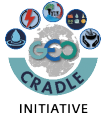GEO-CRADLE brings together key players from three regions (Balkans, North Africa and Middle East) representing the entire Earth Observation (EO) value chain, with the overarching objective of establishing a multi-regional coordination network that will:
The effective integration of EO capacities in the region is the key enabler towards the realisation of GEOSS. GEO-CRADLE has launched an extensive stakeholder consultation activity that will help to create a comprehensive picture of the available EO capacities, identify gaps and capture the level at which user needs are met by existing EO services. Moreover, through the development of Regional Data Hub, the project will facilitate access to and sharing of EO data across and beyond the region of interest.
GEO-CRADLE aims at creating a regional network that will enable the engagement of regional stakeholders across the complete EO value chain (end-users, service providers, scientists and policy makers), and will act as an interface to GEO, Copernicus and other international initiatives. This regional network will support the coherent collection of users’ feedback with regards to needs and priorities, the promotion of best practices and a series of awareness raising activities to inform decision makers on the EO benefits across different business sectors and scientific domains.
GEO-CRADLE places special focus on the uptake of EO services and data as a means for the effective response to regional challenges. To that end, the project will carry out four feasibility studies showcasing the potential of a consolidated regional EO platform for coping with critical societal and economic challenges in the areas of adaptation to climate change, improved food security and water resources management, better access to raw materials and natural resources and a more efficient exploitation of renewable energy sources.
GEO-CRADLE aims to act as a catalyst towards the implementation of GEOSS and Copernicus in the three regions by further extending the impact and magnitude of GEO-related activities in the Balkan region; by building on the momentum created in N. Africa by initiatives such as AfriGEOSS and BRAGMA; and by addressing the significant under-representation of Middle East countries in GEO.
By doing so, GEO-CRADLE aspires to pave the ground for a new large initiative in this very particular by all means (e.g. geostrategic, climate, cultural) region.
